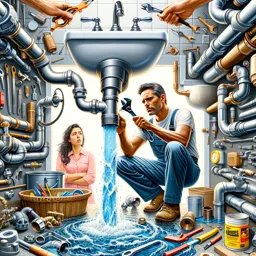Introduction
Plumbing is a key discipline within the construction industry, crucial for ensuring the health and functionality of any building’s water and waste management systems. For those looking to advance their skills in professional plumbing, understanding and mastering essential plumbing tools is fundamental. This article explores the must-have tools every aspiring plumber should know and how they are used on the job.
Hand Tools for Plumbing
- Pipe Wrench: The backbone of any plumber’s toolkit, pipe wrenches are used to tighten and loosen threaded pipes and fittings. Their adjustable jaws can grip pipes of various diameters securely.
- Adjustable Wrench: A versatile tool, useful for turning nuts and bolts of many sizes, especially for plumbing fixtures that require a delicate touch.
- Plunger: One of the simplest yet most effective tools, plungers help clear minor clogs in toilets, sinks, and drains by using suction and pressure.
- Plumber’s Tape (Teflon Tape): Used for sealing pipe threads to prevent leaks—a small but essential detail that ensures watertight connections.
- Hacksaw: For cutting through metal and plastic pipes, as well as bolts and nuts when installing or repairing piping systems.
- Pipe Cutter: These provide a clean and straight cut, essential for neat and professional pipe installations.
Specialty Plumbing Tools
- Basin Wrench: Specifically designed for working in tight spaces under sinks, it makes installing or removing faucet nuts much easier.
- Pipe Threader: Used to cut threads into pipes, allowing them to be screwed together with fittings—a crucial skill and tool for certain plumbing systems.
- Drain Snake (Auger): For clearing stubborn clogs deep within pipes, beyond the reach of a plunger.
- Tube Bender: Used for bending pipes to fit particular angles without causing kinks or damage, important in custom installations.
Protective Gear for Plumbers
- Gloves: Protect hands from sharp edges, hot surfaces, and hazardous substances.
- Safety Goggles: Essential when cutting pipes or using chemicals to prevent eye injuries.
- Knee Pads: Often, plumbers work on their knees, and knee pads can prevent strain and injury.
Conclusion
Becoming a skilled plumber requires not just theoretical knowledge, but also practical expertise with a wide array of tools. Familiarity and competence with these essential and specialty plumbing tools will ensure durability, safety, and satisfaction for clients and professionals alike. If you’re considering a course in construction or plumbing, prioritizing tool mastery is an excellent first step on your career journey.
































